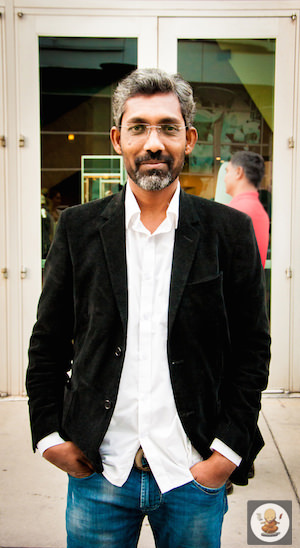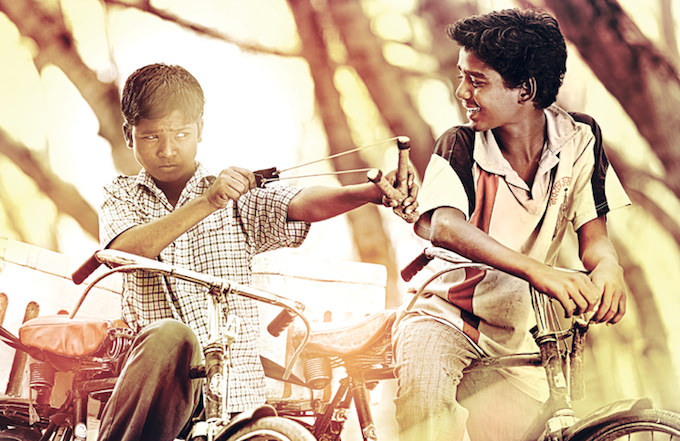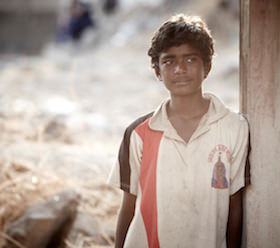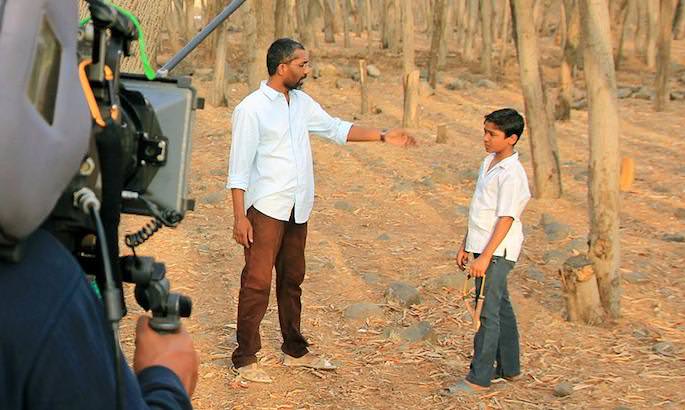
Fandry has taken the film festival circuit by storm. The poignant debut film by writer-director Nagraj Manjule is being hailed as the best Indian film of the year. It is also the year’s highest rated film on TRM!
Unfolding in rural Maharashtra, the story bares India’s dirty secret – the all too present caste system. Jabya, a young Dalit boy is hounded by bullies at school and denied the same liberties as ‘upper’ caste children his own age. He is smitten by his classmate, Shaalu, but cannot muster the courage to tell her. Inspired by the director’s own life experiences, the film is an eye-opener for those of us who thought that the dehumanization of the ‘lower’ caste is a thing of history. “In India, it is never enough to introduce yourself with your first name. One will always probe for your last name, because it instantly identifies you with a region, caste and community”, said the director during a Q&A after the film’s North American premiere at the Indian Film Festival of Los Angeles (IFFLA) earlier this month.
With beautifully shot landscapes and capturing everyday nuances of life in the countryside, the film went on to win the grand jury award for ‘Best Feature Film’ at IFFLA. The Review Monk team had this amazing opportunity for a tête à tête with Nagraj, a soft-spoken and unassuming man, who seemed untouched by all the attention that his film is drawing. Here are some excerpts (translated from Hindi).
“In India, it is never enough to introduce yourself with your first name. One will always probe for your last name, because it instantly identifies you with a region, caste and community”
You have cast mostly non-actors in Fandry. Yet their performances are very natural and believable. Was there any training involved?
I love working with non-actors. I did not make them go through any training. All I ask them to do is learn their dialogues in advance and when they arrive on set, I explain the scene to them and try my best to not make them camera conscious. I usually instruct my crew to stick to their respective roles and not give the cast members any pointers or advice about their performance. With non-actors, it’s very important to retain their unadulterated ‘originality’ and it is my job to motivate them and increase their confidence. That is a very enjoyable process for me.

Can you talk about your intent when you wrote your own character Chankya? Is he a spiritual guru or only another social outcast like Jabya?
Yes, he is an outcast too. Sometimes when a person is hit hard by his reality, he drifts away into a world of dreams. And the one who does not want to accept life for what it is, starts to literally live in this illusory alternate reality. For instance, if I were to fall in love with someone who is impossible for me to get, I will hope for some magic or a miracle to change the outcome. But in reality, the girl will probably never accept me and there could be a myriad reasons for it that may be out of my control. According to me, it is abominable to be an unrealistic dreamer like Chankya.
In the film, ‘Fandry’ is an insult word used to ridicule the Dalits. Have you seen this happen in reality?
Yes, I have very much seen it in reality. It still happens. It is a colloquial Marathi word for ‘pig’.
A lot of the film has been inspired by your personal experiences. Would you say that there has been any positive change in India over all these years, in terms of caste discrimination?
“There is change, but it’s too slow. Discrimination is internalized in us.”
There is change, but it’s too slow. Discrimination is internalized in us. Again, take romantic love for instance. I’ve seen people who desire to find love, but they first worry about their comfort. We always hear these idealistic, hyperbolic phrases about love like ‘Love is blind’ or ‘All’s fair in love and war’, but is that really true? I am yet to see anyone who loves truly unconditionally and blindly. It’s embarrassing for me to admit that in my life I’ve always questioned whether anyone’s love is true or do we just stay with people for fulfilling our needs, and for convenience. We create joint bank accounts, we hail from the same city or the same caste or have very similar social and religious upbringing. These are technical reasons for being together, labeled as love. I have been searching for the ideal love for years, with my specs and binoculars in hand (laughs) and I’m beginning to believe that it is just a theoretical idea.
You are also a well known Marathi poet. How and when did you begin?
Yes, that started a long time ago. When I flunked my tenth standard, I turned into a poet. Actually, I started to write my diary during that time and that slowly developed into poetry writing. At first, I would jot down mundane activities of the day, but soon realized that it made for boring, monotonous pages. So then i decided to write only on the days when I felt like it, for any special reason. Sometimes it was just one sentence or one word that i wrote to express my feeling for the day. Then one day someone pointed out to me that I had actually started writing poetry – only, it was in paragraph form. That’s when I realized my potential and also that poetry has its unique shape and form.
Fandry not only has great narrative but is also technically brilliant and we found ourselves drawing parallels with a lot of renowned filmmakers like Majid Majidi, Satyajit Ray and Shyam Benegal. Who is your inspiration?
“Today, the boy who plays Jabya in my film has become a star in his own right. So the audiences and conversations go beyond the celebrity culture.”
My inspiration is my life. I started to know these masters much later. When I was a young boy, I spent a lot of time inside my own head and I would never express myself to anyone. When I did, people either didn’t understand me or did not accept my ideas. That drew me to writing because we all need an outlet for expression. Poetry was that outlet for me. And now Film is the same outlet where I want to express myself. It is such a wonderful medium which transcends language and borders and it’s a perfect place for me to speak my heart out. 
I saw a few films of Majid Majidi after I made Pistulya and people recommended his work to me. I think he has a unique style flavored with great simplicity in storytelling. Two of my favorite films are Cinema Paradiso (Giuseppe Tornatore) and Bicycle Thief (Vittorio De Sica). I had seen Cinema Paradiso several years ago and I found many parallels in my life with its story. That’s when I realized that such simple stories about common people can also be told. Before that, I believed that without an Amitabh Bachchan or a Shahrukh Khan, you will be unable to tell a story. Today, the boy who plays Jabya in my film (Somnath Awghade) has become a star in his own right. So the audiences and conversations go beyond the celebrity culture. That has allowed me to focus on the characters that I write, rather than who is going to play them.

What are some of the future projects you’re working on? Do you plan on making other films on such social subjects?
There is one which I’ve finished writing and it’s ready to go on the floors. It got a bit delayed after pre-production work, because there have been a lot of such engagements for ‘Fandry’, but hopefully I can start shooting in November.
As for your question about a social subject, i think everything is social. As we stand here talking, this is a social interaction. Even if someone is all alone in a strictly personal space, doing personal things, it is still very much an effect of his surroundings, his society. So that’s still social in my book. I have this new experience in the US, where I am seeing a lot of people roaming about all alone. They could be eating alone or going to the movies alone. But I believe that at no point do they become completely detached from what we identify as social. We speak a language that couldn’t have been possible without a social consensus. If not for language, it would be difficult to form our thoughts, or to write poetry. So I see everything around me as a social subject.
With that, we decided it was time to let Nagraj proceed to the awards ceremony. He complimented me for my name and confirmed its pronunciation for the third time. And true to his message, he never asked for our last names.















